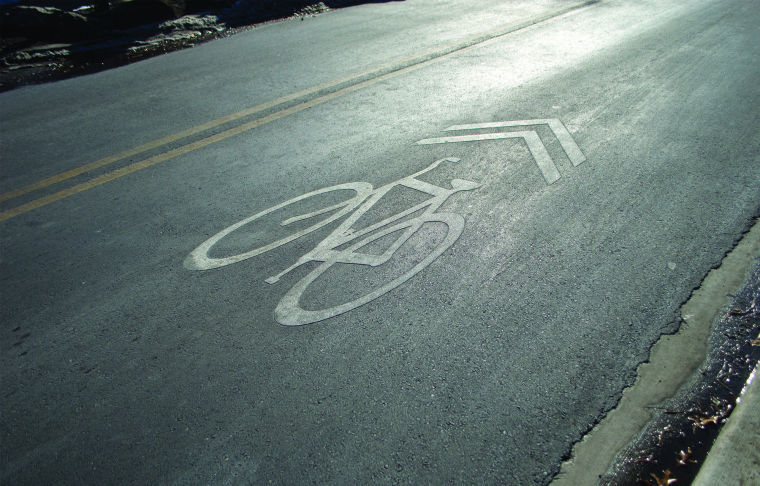
One of many marked “sharrows” on and around the campus
Over the summer, DOTS took steps to make the campus more bicycle-friendly as part of its initiative to decrease university greenhouse gas emissions.
In collaboration with Facilities Management and bikeUMD, the Department of Transportation Services laid down white chevron-shaped signs with the image of a bicycle on roads on and near the campus to signal bicycle-friendly streets.
The shared lane markings, known as sharrows, were installed to make motorists aware of cyclists on the road and provide a safer commute, as well as to designate the best and smoothest roads for cyclists.
These designated cycling roads will help students who ride bikes to class daily, such as Aaron Rubinstein, a senior bioengineering major.
“I don’t always feel comfortable biking in the street,” Rubinstein said.
Sharrows are one of the many initiatives DOTS has taken to support and educate bikers, said Valerie Goubeau, DOTS marketing, communications and demand management assistant director.
DOTS is working to install more bike racks around the campus, especially near the science and math buildings in the northeast portion of the campus, where biking is popular, Goubeau said. DOTS has received many complaints about a lack of space on racks for students’ bikes, she said.
A grant from the Office of Sustainability funds the bike racks. The fund was developed shortly after former university President Dan Mote signed the American College and University Presidents’ Climate Commitment in 2007 that was approved by the University Senate in 2009.
The Climate Action Plan’s goals include working toward eliminating this university’s greenhouse gas emissions.
“The commuting footprint is actually a pretty big part of our overall carbon footprint,” said Office of Sustainability senior project manager Mark Stewart. “DOTS has been a great partner for years now with meeting Climate Action Plan goals.”
In a 2010 study, researchers found that between students and faculty, commuting accounts for 40 percent of the university’s transportation emissions.
DOTS’ support of alternative modes of commuting, including Shuttle-UM and car-share services such as Zimride and Zipcar, have helped in cutting the commuter footprint by 6 percent between 2009 and 2010, according to a DOTS report. Additionally, DOTS has been issuing a shrinking number of on-campus parking permits to encourage students to use other forms of commuting.
“We’ve definitely seen an increased number of students especially, but also faculty member and staff, walking and biking to campus,” Stewart said.
In recent years, the university’s cycling program has grown significantly; DOTS has taken on many interns as well as a full-time bike coordinator, Goubeau said.
“We’ve been making great progress in terms of bike infrastructure,” she said.
DOTS also offers other initiatives to support and encourage cycling on the campus, including free bike maintenance for students at the Campus Bike Shop and discounted sales of bike gear.
Rubinstein bought his bike lock and helmet from the shop and frequently visits the shop, he said.
“We know a bunch of students and employees are biking, but only a small percentage are registering their bikes,” Goubeau said. “While we see this, we can’t qualify it.”
By registering bikes, students would provide DOTS with a better understanding of campus cyclists and their needs, which would lead to improved support, Goubeau said.
While DOTS works with the Student Government Association and graduate students to publicize alternative transportation initiatives and holds an annual transportation fair on the campus, Goubeau said the organization has problems with publicity.
“One of our biggest challenges is making students aware of what is available to them,” Goubeau said, mentioning the department’s annual Bike Week from April 7 to 11.
Goubeau said she was looking to set up a network for cyclists from different areas to meet up, creating a community that would want to bike and commute together.
“Our goal is to support cyclists,” Goubeau said.



